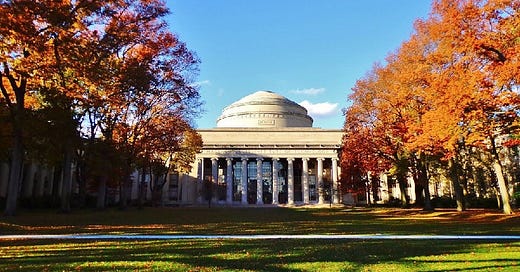🎓 Why MIT was smart to again require SAT and ACT scores
Also: China's top-down innovation policy is failing. America and the West shouldn’t try to mimic it.
In This Issue
5QQ: 5 Quick Questions for … Naomi Schaefer Riley on SAT and ACT college tests, and MIT’s reversal
The Essay: China's top-down innovation policy is failing. America and the West shouldn’t try to mimic it.
Macro Reads: STEM immigration, self-driving cars, the crypto caucus in Congress, and more …
Nano Reads
Quote of the Issue
“If we have a world in which China is harnessing the meritocratic idea to reinforce the power of the Communist Party, and America at the same time is dismantling meritocracy or softening meritocracy … if you have these two things going on at the same time, America loses. China becomes a massive version of Singapore. America becomes, I don’t know, a version of Brazil or something like that, and you lose. They win.” - Adrian Wooldridge, author of The Aristocracy of Talent: How Meritocracy Made the Modern World
5QQ
❓❓❓❓❓ 5 Quick Questions for … Naomi Schaefer Riley on SAT and ACT college tests, and MIT’s reversal
Item: “Students applying to the Massachusetts Institute of Technology in 2022 will have to submit SAT or ACT exam scores, the university announced on Monday, nearly two years after suspending the requirement because the pandemic had disrupted testing for many applicants. The requirement was reinstated ‘in order to help us continue to build a diverse and talented M.I.T.,’ Stu Schmill, the dean of admissions and student financial services and a 1986 graduate, said in a statement. ‘Our research shows standardized tests help us better assess the academic preparedness of all applicants,” he said. The decision will affect first-year students or transfer students who want to enroll at M.I.T. in 2023.’” (The New York Times, March 28, 2022)
Naomi Schaefer Riley is a senior fellow at the American Enterprise Institute and the author of six books. Her work appears in outlets such as The New York Times, The Wall Street Journal, and The Washington Post. In a recent Bloomberg Opinion article, "Dropping the SATs Opens the Door to More Legacy Students," she and James Piereson argued that eliminating standardized testing requirements for admission into elite universities could give legacy applicants further advantages.
1/ You argue that dropping SATs will give greater weight to less objective measures like personal essays, allowing elite schools to admit more legacies. What incentive do they face to prefer legacies to high-SAT earners?
The decision is not exactly a binary one. The question is whether it is worth it to schools to give a little on the SAT scores in order to gain a little more goodwill with alumni. Elite schools want it to be known among their alumni population that they reward loyalty, that their children will be welcomed as members of the university “family.” They have made the calculation that this kind of family continuity is worth it for their bottom line.
Keep reading with a 7-day free trial
Subscribe to Faster, Please! to keep reading this post and get 7 days of free access to the full post archives.




